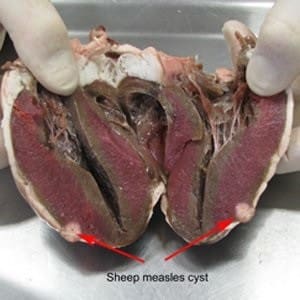RECENT sheep measles infestations reported by Tasmanian abattoirs have prompted calls for farmers to control tapeworms in working and hunting dogs.
In the last few weeks, 44 lambs have been condemned by TQM and JBS abattoirs after meat inspectors found evidence of heavy infestation of sheep measles.
Each condemned lamb cost the producer an average of $93 and there were further losses when some lambs were downgraded following trimming of less heavily infected animals. The lambs were infected by eating pasture contaminated with the eggs of the dog tapeworm, Taenia ovis.
Tasmania’s Department of Primary Industries Parks, Water and Environment and the Livestock Biosecurity Network is urging prime lamb producers to act to prevent the disease from occurring.
To control the risk of sheep measles developing, the DPIPWE has recommended that farm and hunting dogs be treated monthly with a wormer that contains praziquantal and that raw sheep meat is not fed to dogs unless the meat has been frozen for at least 21 days. Proper disposal of dead sheep and offal on farm is also essential to reduce the risk of dogs eating infective cysts. Stray dogs on farms must also be controlled. All dogs entering Tasmania must be treated with praziquantel to prevent them from bringing hydatids into the State.
Sheep measles costs producers and processors
TQM quality assurance manager Colin Reid said the financial impact of sheep measles was significant.
“We are really concerned when we see a heavy infestation of sheep measles cysts in young sheep because we know what a significant financial impact this has on the producer.
“When we contact the producer to let them know it is always comes as a great shock for them.”
DPIPWE senior veterinary officer Dr Bruce Jackson said if more than five cysts are found in a carcase, that sheep or lamb is condemned.
“Depending on how the lambs are sold, the abattoir may take the financial loss or the producer; either way, sheep measles is a costly disease for the sheep industry,” he said.
Tasmania’s Livestock Biosecurity Network regional officer Dr Jess Coad said although sheep measles doesn’t occur too frequently, when it does occur it can really hit a producer’s back pocket.
Cysts are usually found in the heart and the diaphragm and sometimes in the muscle. Carcases are trimmed if less than five cysts are found in the muscle. If more than five cysts are found, the carcase is condemned. Trimming and condemnations cost both producers and processors money.
She said sheep measles are the cystic (larval) stage of one of three dog tapeworms that infect sheep. Other sheep diseases caused by dog tapeworms are bladder worm and hydatids. Sheep become infected when they ingest the tapeworm’s eggs deposited from dog faeces excreted on pasture.
Worm dogs monthly with praziquantel
Dr Coad said worming dogs monthly with a tablet containing praziquantel also covered bladder worm and hydatids. Good on-farm biosecurity ensures all dogs entering a property with hunters, contractors, shearers, and so on, have been wormed with praziquantel in the last month, or don’t access pasture, e.g. are kept tethered, she said.
“Feeding packaged commercial dog food is the best way to prevent reinfection with sheep measles.
“Feeding offal to dogs in Tasmania is banned as part of measures to prevent hydatid disease, and in turn prevent sheep measles. To stop dogs scavenging on carcasses, bury or burn carcasses as soon as possible.”
Dr Coad said sheepmeat and bones fed to dogs should be either cooked till it is brown all the way through or frozen for a minimum of 21 days to ensure there are no viable tapeworm cysts. If freezing, clearly label meat with a ‘not to be used before’ date when storing.
“Prevention of sheep measles takes time and persistence as the tapeworm eggs can survive for up to 300 days on pasture.
“The eggs can also be transported mechanically by flies for some distance, so control is best on a district basis,” she said.
“It’s worth talking to your neighbours about their dogs worming protocol.”
Lambs don’t show sheep measle signs
Dr Coad said affected sheep show no outward signs, meaning sheep measles is only discover when sheep are slaughtered.
“There is no practical treatment for the cysts in sheep – once a sheep is infected, the cysts are there for life.
“For this reason, lamb traders in particular should consider whether lambs are coming from a farm that manages the risk posed by farm, neighbouring and visiting dogs.”
For more information on sheep measles, see the fact sheet on the LBN website at www.lbn.org.au under the Biosecurity Tools tab.
Sources: Livestock Biosecurity Network and DPIPWE



Why is there no vaccine for farmers to use? I believe one was developed years ago.